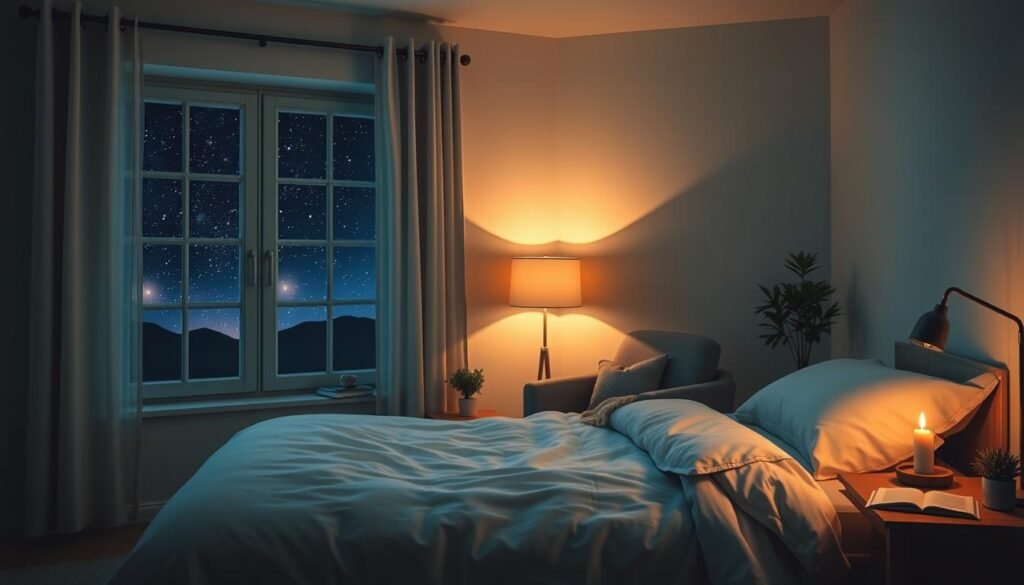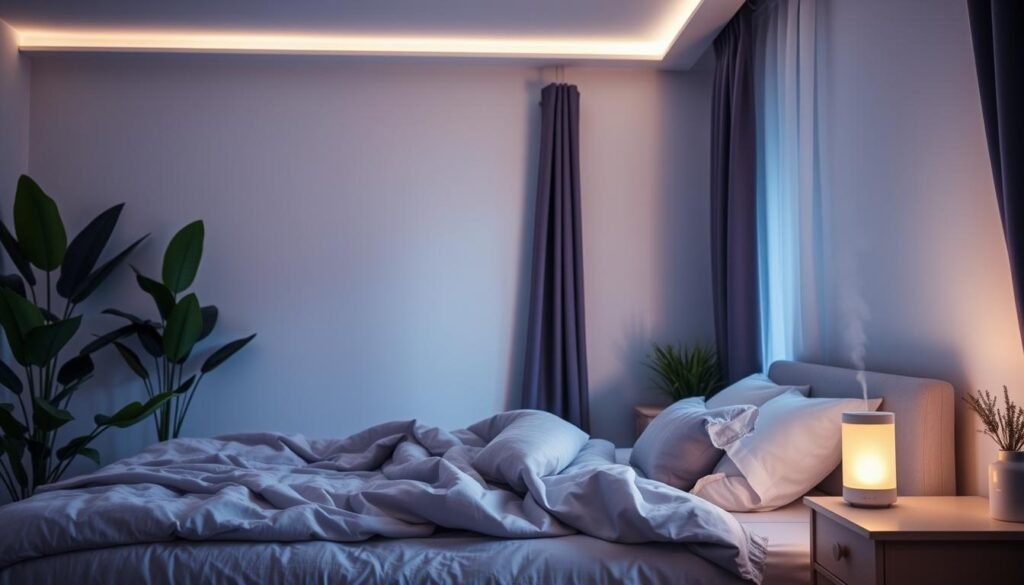About 58% of individuals with major depressive disorder also have a lifetime anxiety disorder. This fact shows how closely insomnia and anxiety are linked. It also stresses the need for good treatments. People dealing with both insomnia and anxiety experience a tough cycle. This cycle affects their life and daily activities. Finding the right treatment is key to better sleep and mental health.
To tackle insomnia and anxiety, understanding their connection is crucial. This article will explore symptoms, diagnosis, and treatment options. These options include new therapies and natural remedies. It’s important to focus on comprehensive treatments. Such focus helps overcome sleepless nights and anxious days.
Key Takeaways
- Cognitive Behavioral Therapy (CBT) is a recommended first treatment for insomnia.
- Effective insomnia treatments include both behavioral strategies and medication.
- Anxiety treatment options often overlap with strategies used for insomnia.
- Prescription sleep aids are not advised for long-term use and may lead to side effects.
- Lifestyle changes such as physical activity and avoiding stimulants can improve sleep quality.
- Alternative therapies may help, but their effectiveness is not always strongly supported by research.
- Creating a relaxing bedtime routine is essential for better sleep hygiene.
Understanding Insomnia and Its Relationship with Anxiety
Insomnia often goes hand in hand with anxiety disorders, making things tough for mental health. Many people with insomnia see big changes in their daily lives. For example, sleep often escapes those with anxiety-induced insomnia, leading to less rest at night and more issues during the day.
Symptoms can include feeling tired, having trouble focusing, and being more likely to make mistakes. The link between insomnia and anxiety is key to understanding their effects. Lack of sleep can increase cortisol, a stress hormone, making the cycle of anxiety and insomnia worse. This can lead to mental health problems like major depression.
Those with chronic sleep loss often show signs of depression and anxiety, such as irritability. Research points out that little sleep makes negative feelings stronger. At the same time, enough sleep can help manage these emotions. Insomnia is common in anxiety disorders like PTSD and GAD, even with treatment like cognitive behavioral therapy (CBT).
Insomnia often remains after anxiety gets better, showing the need for focused treatment. Studies suggest that insomnia contributes to worse outcomes in anxiety therapy. Poor sleep can slow down the progress in CBT for anxiety. This shows a strong connection between insomnia and anxiety, stressing the need to treat both together.
Common Symptoms of Insomnia and Anxiety
Symptoms of insomnia make it hard to fall asleep or stay asleep. People often wake up too early and don’t feel rested. Most adults need 7 to 9 hours of sleep to feel good. If insomnia goes on for months, it becomes chronic, harming health.
Anxiety symptoms include a lot of worrying, feeling restless, and trouble focusing. These issues can make insomnia worse, creating a bad cycle of sleep problems. Older adults often have trouble sleeping. Risk is higher for women, those over 60, and people with health problems.
Insomnia can lead to worse performance at work or school and more accidents. It also raises the risk of mental health issues. Stress or bad habits can cause long-term insomnia. Anxiety can also make sleep problems worse, raising concerns for those affected.
About one in three adults deal with insomnia anxiety symptoms at times. It’s important to manage both to improve well-being. Good sleep routines and relaxation can reduce insomnia and anxiety.
Diagnosis of Insomnia and Anxiety Disorders
To treat insomnia and anxiety effectively, accurate diagnoses are a must. This begins with a detailed physical exam and reviewing one’s sleep history. Doctors often use tools like the Pittsburgh Sleep Quality Index and sleep logs. These methods help understand a patient’s sleep habits and issues clearly.
About 40% of those with anxiety also face insomnia. This link shows the importance of tackling both conditions together. Anxiety and sleep problems often make each other worse. This can make finding the right diagnosis tricky.
Sometimes, a sleep study, known as polysomnography, is needed. It checks how well someone sleeps and can uncover issues like sleep apnea. This detailed test aims to pinpoint exact sleep problems. Then, doctors can create a specific treatment plan.
Noticing signs of anxiety disorders is crucial, especially how they relate to sleep troubles. For example, generalized anxiety disorder and PTSD often lead to sleeping problems. A thorough exam helps in making an accurate diagnosis. This allows for more effective treatment plans that can vastly improve someone’s life.
For more details on these complex issues, check out this link. It’s key to understand the diagnostic process. This knowledge aids in finding suitable treatments for those battling insomnia and anxiety.
There’s also useful info about different sleep disorders here. This guide stresses how vital correct diagnosis and treatment are for better sleep and health overall.
Effective Treatments for Insomnia and Anxiety
Finding effective treatments for insomnia and anxiety includes various strategies. Cognitive Behavioral Therapy (CBT) is a long-term solution. It helps individuals change their thoughts and behaviors causing sleep issues and anxiety. Adding this to insomnia treatments makes them more effective.
Medications can offer quick relief but must be used with care. Benzodiazepines and Z-drugs like eszopiclone, zaleplon, and zolpidem are common choices. These drugs work differently and can have side effects. It’s important to talk to healthcare providers for personalized treatment for anxiety disorders. While helpful, these medicines also come with risks like dependency and withdrawal symptoms.
Lifestyle changes can improve recovery from insomnia. Keeping a regular sleep schedule and good sleep hygiene are key. Regular exercise helps too. It supports physical health and improves sleep by releasing endorphins that regulate mood and energy.
Creating a supportive sleep environment is crucial. A dark, distraction-free bedroom encourages deeper sleep. This is important for handling insomnia and anxiety. Deep breathing and meditation can also help.
In summary, treating insomnia and anxiety involves combining behavioral therapies, medications, and lifestyle changes. These strategies help individuals improve their sleep and overall health.
Behavioral Interventions for Managing Insomnia
Behavioral strategies help improve sleep and well-being. By using certain methods, people can tackle the main causes of their sleep problems.
Sleep Diaries and Sleep Habits Review
Keeping track of sleep with diaries is useful. It highlights which actions might lead to poor sleep. It also aids in discussing concerns with doctors. One can notice patterns by recording when they sleep and the environment around them.
Cognitive Behavioral Therapy (CBT) for Sleep Disorders
Cognitive Behavioral Therapy for Insomnia (CBT-I) is a top treatment for lasting sleep issues. This therapy mixes mind and behavior changes to fix sleep problems. About 70% to 80% of people see great improvement after 6-8 CBT-I sessions. It works better and lasts longer than pills. For more details on CBT-I, visit this resource.
Relaxation Techniques as Self-Help Strategies
Using relaxation methods before bed improves sleep. Activities like muscle relaxation and deep breathing help calm the mind. They’re good for falling and staying asleep, helping many achieve deep sleep.

The Role of Medication in Treating Anxiety and Sleep Problems
Understanding medication is key when dealing with anxiety and sleep troubles. The choices include both prescription drugs and over-the-counter aids. They play a big role in controlling symptoms.
Prescription Medications
Doctors often suggest medication for anxiety and sleep problems. They recommend drugs like non-benzodiazepines and benzodiazepines. These help improve sleep, lower anxiety, and encourage relaxation. It’s crucial to use the smallest effective dose to reduce side effects and prevent dependency.
Some popular options are:
- Zolpidem (Ambien)
- Eszopiclone (Lunesta)
- Temazepam (Restoril)
- Lorazepam (Ativan)
These medications work well for those with chronic insomnia, which is about 15% of people. They are especially helpful when anxiety plays a role.
Over-the-Counter Sleep Aids and Their Efficacy
Over-the-counter sleep aids are another choice. They’re easy to get and often contain antihistamines to help you sleep. But, be careful with these due to possible side effects and the chance of tolerance if used a lot. Some known over-the-counter aids are:
- Diphenhydramine (Benadryl)
- Doxylamine (Unisom)
- Melatonin supplements
Even though over-the-counter sleep remedies can help in the short term, they are not a long-term solution. Chronic insomnia usually needs a mix of medication and therapy for the best results.
| Type of Medication | Example Brand | Target Issues | Primary Concern |
|---|---|---|---|
| Prescription Sleep Aids | Ambien | Insomnia | Dependency risk |
| Prescription Sleep Aids | Lunesta | Insomnia | Side effects |
| Over-the-Counter Aids | Benadryl | Sleep Issues | Drowsiness next day |
| Over-the-Counter Aids | Unisom | Sleep Issues | Tolerance build-up |
Creating a good treatment plan requires balancing medication, behavioral techniques, and non-drug methods. This approach best supports those battling anxiety and sleep issues.
Natural Remedies for Anxiety and Insomnia
Many seek natural remedies for anxiety and insomnia. They look for options besides traditional treatments. Things like herbal supplements and relaxing practices are popular. Combining lifestyle changes with these remedies helps improve well-being and sleep.
Herbal Supplements and Their Effectiveness
Herbal supplements are gaining popularity for sleep issues and anxiety. Melatonin, valerian root, and chamomile are common choices. Melatonin can shorten the time it takes to sleep and may extend sleep length.
Valerian root could improve sleep quality for some people when taken before bed. Chamomile has helped older adults sleep better. However, it’s crucial to check the safety and right amounts of these supplements. Looking into resources like this article on insomnia home remedies can offer deeper insight.
Mindfulness and Meditation Practices
Mindfulness, including meditation and deep breathing, can ease anxiety and help with sleep. Meditation has helped reduce awakenings in those with chronic insomnia. Practices like Progressive Muscle Relaxation are recommended for better sleep.
Adding mindfulness to your daily life can ease anxiety and improve sleep. It’s best to combine this with good sleep habits for optimal results. Regular exercise, about 150 minutes a week, can also help with insomnia.

Holistic Approaches to Treat Insomnia and Anxiety
Holistic approaches to treat insomnia and anxiety look at how everything in our lives is connected. These methods mix traditional and alternative treatments. They aim to provide full care for those having trouble sleeping.
Exercise is key for many people. Activities like walking or swimming improve sleep. It’s also good to keep your sleeping area cool, between 65 and 72 degrees. This is very helpful for people dealing with hot flashes from menopause.
What you eat and drink matters too. Chamomile tea and tart cherry juice are known to ease sleep problems. Herbs like Valerian root and Ashwagandha can also help. They might make REM sleep better and increase sleep quality.
Acupuncture can be effective for better sleep. Practices like relaxation techniques, meditation, and sleep hypnosis reduce anxiety. They help your mind settle down for sleep. Using these holistic methods regularly can address sleep issues and boost your well-being.
Exploring herbal medicines is crucial. Over 80% of people worldwide use herbal remedies. This shows their value in healthcare. Lemon balm and Kava are two herbs that may help with insomnia and anxiety. They are good non-pharmaceutical options.
| Method | Benefits | Notes |
|---|---|---|
| Exercise | Improves sleep quality; Boosts deep sleep | Moderate aerobic exercise is most effective |
| Nutrition | Natural relief from sleep issues | Chamomile tea, tart cherry juice recommended |
Creating a Healthy Sleep Environment
Creating a healthy sleep space is key to better rest. It’s important to keep sleep hygiene in mind to reduce sleep disruptions. Knowing what affects your sleep lets you make an area that helps you relax.
Importance of Sleep Hygiene
To sleep well, maintaining good sleep habits is crucial. These habits include:
- Keeping the bedroom dark and quiet to eliminate distractions.
- Sticking to a regular sleeping and waking schedule.
- Using your bed only for sleep to signal your brain it’s time to rest.
- Avoiding big meals, alcohol, and caffeine before bed.
Techniques for a Comfortable Sleep Setting
There are ways to make your sleep space more comfortable. These methods help with better sleep:
- Making sure the room is cool can improve sleep quality.
- Using earplugs or white noise machines to reduce noise.
- Cutting down on screen time before bed to avoid messing with your sleep pattern.
By following these tips, you can boost your sleep quality. They help tackle sleep issues like insomnia and anxiety. Taking steps to make your sleep environment better has lasting benefits. It helps keep your sleep routine peaceful.

Self-Help Strategies for Insomnia and Anxiety
Dealing with insomnia and anxiety needs simple self-care steps people can use every day. Making small changes in lifestyle can lead to better sleep and less anxiety.
First, sticking to a regular sleep schedule is key. Sleeping and waking up at the same times daily can help. This regularity trains the body’s internal clock, aiding in better sleep. Also, a calming routine before bed, like deep breathing or muscle relaxation, is helpful.
- Avoid caffeine and nicotine for at least four hours before bedtime.
- Limit alcohol consumption, as it can negatively affect sleep quality.
- Create a dark and quiet bedroom environment, conducive for sleep.
- Engage in regular physical activity, but avoid vigorous exercise close to bedtime.
- Steer clear of screens for at least an hour before bed to reduce blue light exposure.
- Stay socially active and maintain a support system to combat feelings of anxiety.
If you can’t sleep, writing down your thoughts before bed can help clear your mind. It’s also good to understand what affects your sleep, like stress or mental health issues. If you stay awake for more than 20 minutes, try doing something relaxing until you feel sleepy again.
Using these self-help tips for better sleep and anxiety management is empowering. Not just for better sleep, but for improving your overall happiness too. Talk to a doctor if sleep problems don’t improve with these strategies.
Conclusion
For managing insomnia and anxiety, a varied approach is vital. It’s important to know the symptoms and get the right diagnosis. Options include behavior therapy, such as cognitive behavioral therapy for insomnia (CBT-I), meds, and natural cures. This means individuals can choose what works best for them.
Improving sleep and reducing anxiety means using effective strategies. This includes practicing good sleep hygiene and making your sleep space cozy. Studies show CBT-I can help you fall asleep faster and wake up less during the night. These improvements can last for years. Trying self-help methods can also boost mental health and lead to better sleep, often without the need for meds.
It’s crucial for people to get help and try these methods to better their life quality. Knowing how insomnia and anxiety affect each other, and acting on it, can improve sleep and reduce anxiety. Working together, we can ensure better sleep and mental health for those struggling.